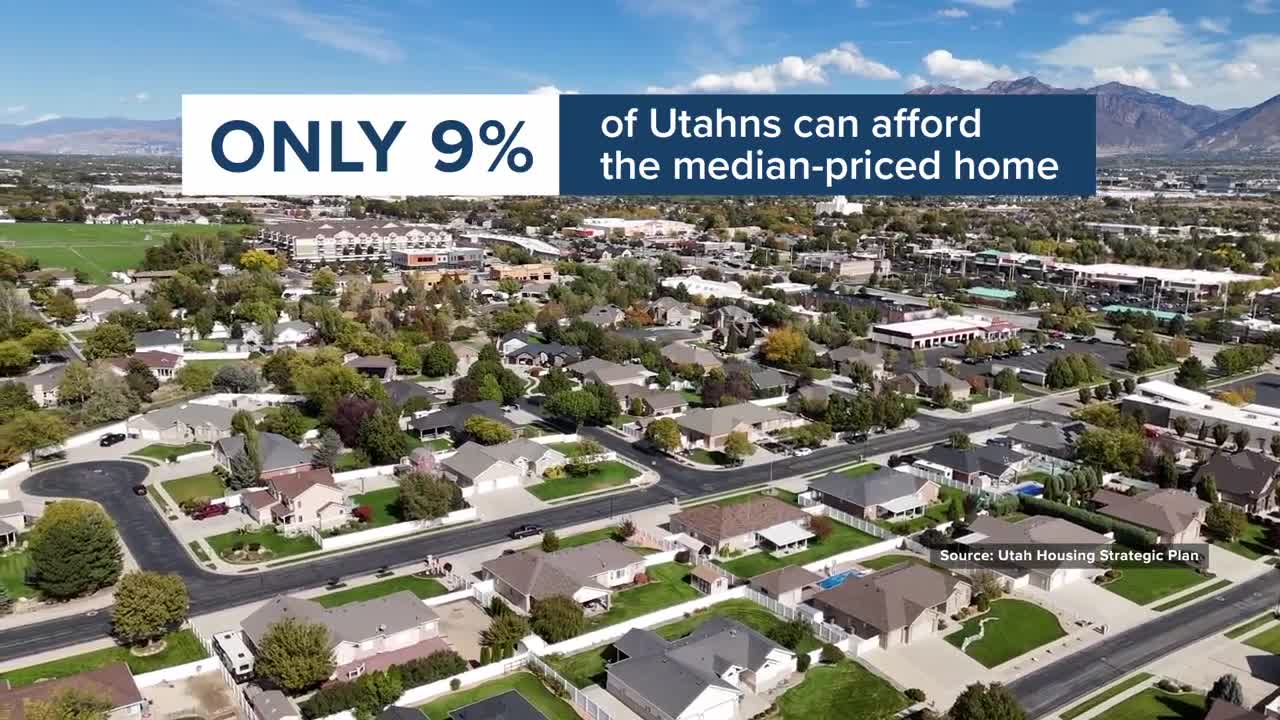SALT LAKE CITY — A new report prepared by Governor Spencer Cox's office presents some troubling numbers about Utah's housing crisis and offers some solutions to help fix it.
The report, presented on Wednesday to the Utah State Legislature's Political Subdivisions Interim Committee, dives deep into Utah's housing issues and calls for changes.
"We have to change the things we are doing. We cannot say it’s going OK right now. Because it’s not," said Steve Waldrip, the governor's advisor on housing issues. "We’re not providing enough housing. We’re not providing enough attainable housing for our kids and grandkids."
Only 9% of Utahns can now afford a median-priced home (which is about $500,000). The median age of a first-time homebuyer? Is now 38. Utah needs 233,000 more housing units to meet 2033 demand.
Things aren't much better for renters. The report said more than 45% of people are "rent-burdened," and 20% of those are spending more than half their income on rent.
Those figures are something many FOX 13 News viewers can relate to. Many weighed in on a social media post about the report with their own stories of having trouble finding affordable housing and paying rent. It was something some lawmakers on the committee could relate to as well.
"My son and his wife live in a condo and it cost them over $400,000 and they did have the $20,000 down, but it’s still very expensive for them. I think they stress about it every month," said Rep. Leah Hansen, R-Saratoga Springs.
"We have higher demand than we have supply. As we bring supply and demand into balance, we’ll have affordability," Waldrip replied.
The report makes some recommendations for ways to help ease the housing crisis, including turning some government-owned land into housing (land owned by Utah's Department of Transportation was floated as an example); forcing some affordability in government-funded projects with deed restrictions; changing regulations on types of housing; incentives and loan programs to boost development and spending money.
It is going to take a lot of money, said Tara Rollins, the executive director of the Utah Housing Coalition, a nonprofit group that advocates for affordable housing in the state.
"I don’t think the policy will make a difference unless we get funding. We really need the funding to help the policy. So we need to invest. You know, we have a huge rainy day fund. It’s raining," she said.
Rollins gave input on the governor's report and praised its recommendations. But she added she would like to see more discussion on supporting renters. The report, Rollins said, also underscored economic issues in the state. To afford a modest, two-bedroom apartment in Utah? Someone would need to make $29.29 an hour, she said.
"We have so many low-wage jobs in our state and they deserve a place to live," Rollins told FOX 13 News.
First Step House, which specializes in deeply-affordable housing and services for individuals with mental illness, said the governor's plan has "bold strategies that, if implemented, will significantly improve housing stability for Utahns facing serious barriers."
First Step House Executive Director Sean McMillen said he liked a recommendation to expand use of Medicaid funds to support services in housing for people who need them.
"This model is not only humane, but also fiscally responsible. We are currently developing three new supportive housing buildings, and this tactic would directly strengthen our ability to serve Utah’s most vulnerable citizens," he said. "The alternative – letting people cycle between incarceration, hospitalization, and homelessness – is far more costly and far less effective."
Waldrip acknowledged there would be challenges. Government can't come up with all the money, he reminded lawmakers, who are already bracing for a potentially lean budget year.
"There are going to be challenges when we talk about what the state gets to tell cities to do and the cities don’t want the state to tell them what to do," he said.
The plan will go out for public comment before it is required to be finished by the end of this year. Some of the policy recommendations could also turn into bills in the upcoming legislative session.
"I think everyone is on the same page understanding we have a serious issue, we have a great need and they’re looking for leadership and direction to make sure the things we’re doing are going to make a measurable difference," Waldrip told FOX 13 News.
Read the governor's report here:




